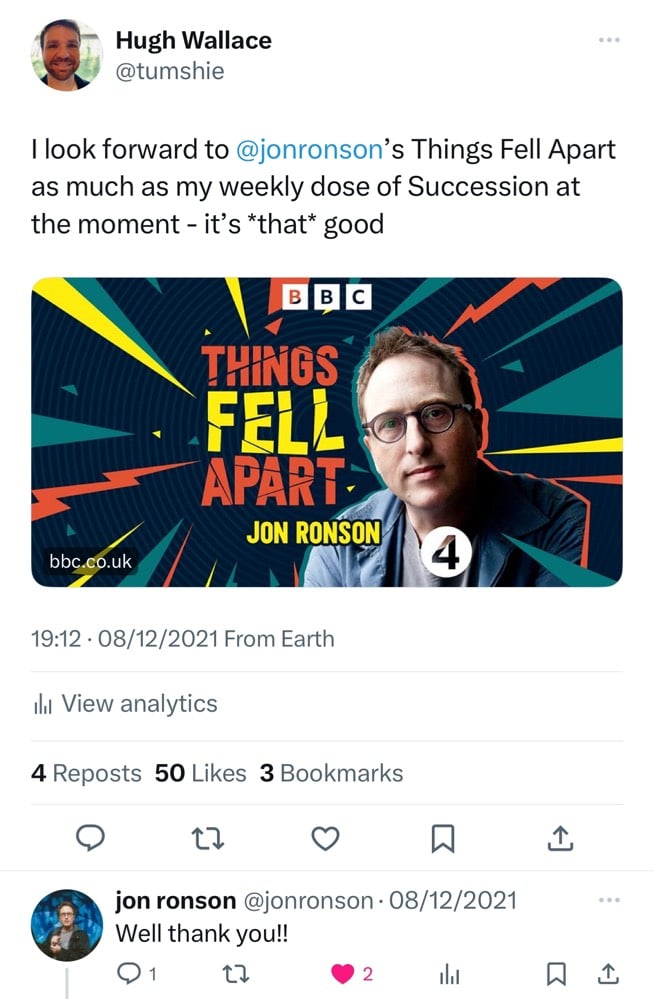Not so big, hairy or audacious
Like practically everyone I know, I spent December enthusiastically putting things into a seemingly infinite 'pick up in January' pile, forgetting that my brain dries to a crisp in the week between Christmas and New Year.
It was therefore unfortunate to discover this week that I'd keenly scheduled a 'visioning' session, and was now at a point where I could barely remember how to spell or say my own name.
Thankfully I'd done a little bit of prep last month so had a reasonably well thought-through Miro board and some overall objectives that sounded like I'd not made them up on the spot.
I used the Big Hairy Audacious Goal model (or BHAG/Beehag) because it's nice and straightforward to get your head around. When I've employed it in the past I've found people latch onto it, which I reckon is at least 75% down to its funny name.
I don't think it's necessarily right for every organisation, or at every stage of play, but as a simple provocation to get people talking it can work well.
Also, at the start of the year when everyone is in the same boat trying to deal with their own oh-god-it's-January horror 😱, forcing people into a room and hoping they have the headspace to dream up/articulate super strategic thoughts is a bit much, isn't it?
Using a technique like BHAG offers an accessible way of getting ideas out of people's minds, without feeling like the output needs to be printed, bound, and put on show with a beautifully embossed cover.
Perhaps unsurprisingly the session ended up opening up more questions than it answered. Less 'big, hairy, audacious', more 'medium-sized, sensibly shorn, politely probing', which has a bit less zing to it. That's not a bad result for the first full week of the calendar year though.
I take solace from sensible people like Tom Dolan whose work-in-progress roadmap blog post reminds us that it's OK for things to (maybe even perpetually) be a work-in-progress: "Roadmapping is more important than an actual roadmap". Quite.
In the spirit of easing myself back in, I've listed out a few things I've been listening to below. It might just be me and my algorithms but I found there was a strong New Year self-care vibe in my podcast library – while that kind of thing's not always my bag, I particularly enjoyed the first two listens on the list. The next two links are less calm and relaxing, however they certainly gave my brain a shake.
🎧 How to reboot your memory for 2024
A nice interview with cognitive neuroscientist Charan Ranganath about why our memories are shot to pieces. I liked this because it gave me a plausible explanation for why I can never find any of my three(!) pairs of glasses I've carelessly discarded around the house.
🎧 Tired? Distracted? Burnt out? Listen to this
Ezra Klein interviews Gloria Mark about her book Attention Span and it's fascinating to hear how under attack our attention is all of the time. Talking through the tyranny of the email inbox definitely resonated.
🎧 Things Fell Apart - Season Two
Where to start? I'm an unashamed Jon Ronson fanboy – I've read just about all of his books, and I find his audio output scintillating. Here's a tweet from 2021 when I was gushing about the first season of Things Fell Apart (he replied! Be still my beating heart).

Picking up from where S1 left off, this season brings his exploration of the stories behind the culture wars into contemporary focus, exposing where and how the Covid pandemic has further sown division and distrust.
It's engrossing, surprising, and even jaw dropping at times – the twist about the litter box hysteria in episode 5 packs quite an emotional punch.
I don't know whether my continued intrigue around the so-called culture wars is unusual, but I think being so deeply ingrained in early web culture is a big factor.
As I've touched on at various points in my newsletters, being a cheerleader for all things digital, while looking on with alarm as a lot of it goes to shit has been (and remains) a weird paradox in my jobs/life.
Jon's acclaimed 2015 book So You've Been Publicly Shamed was one of the first long-form studies of the insidious underbelly of social media and I love the fact he's run with, and evolved, the topic over the years.
I also can't recommend Naomi Klein's Doppelganger enough if you're looking for a further culture wars deep dive and an at-times shocking look into the 'Mirror World'.
🎧 Hard Fork: Why Casey Left Substack
And talking of culture wars, the on-going situation with Substack has the classic hallmarks of the polarised online world we live in.
I've obviously already shouted into the void about my own reasons for parting ways with Substack, however the exodus of more and more writers has been notable in the last couple of weeks.
The latest Hard Fork is an insightful listen as it fleshes out the reasons why Casey Newton decided to replatform Platformer, up to this point Substack's most popular newsletter with its 170,000+ subscribers.
The audio Q&A allows for more nuance than a straightforward blog post, although I'd also point to the compendium-worth of thoughtful pieces people have written about their own decisions to leave – among them Molly White, Sharon Hurley Hall, PJ Vogt, Hannah Raskin, Rusty Foster, Ryan Broderick, Paris Marx and Jonathan Katz (whose original 'Substack Has a Nazi Problem' article in The Atlantic spurred a lot of this activity).
They take with them hundreds of thousands of subscribers, which equates to a significant chunk of Substack's revenue and one presumes a big part of their future projections.
Speaking of nuance, most of the writers above have been careful to explain that the business of running modern Internet platforms is complicated, rather than rushing to claim there are easy answers to online content moderation.
All such nuance tends to get lost when that content comes in the form of posts in an algorithm-driven feed. Substack Notes, the Twitter-like bolt-on to the email delivery service, has quickly become a place where mud gets slung, points get scored, and nobody is happy.
I've posted about 20 times in Notes but my feed is frequently about Nazis, or what people do or don't think is a Nazi, or that it's Nazi-like behaviour to call for the censoring of Nazis. Even though I subscribe to a huge range of newsletters, I constantly get punted the sensational stuff. Algorithm's gonna algorithm I guess.
The specific 'Nazi' content was always the thin end of the wedge for me, it's the tacit approval that's more troubling. Any serious, grown-up consideration of what a lax approach to moderation encourages or enables is absent from everything the Substack leadership team have said or signalled on the matter.
I've trudged through too much online sewage over the years (thanks Twitter!) to keep bumping into angry men and their pernicious, libertarian, just-shy-of-overtly-racist views, and I don't want to be part of a platform where they feel comfortably at home.
That's more than enough on Substack for now. For ever probably. Need to get back to grumbling about AI 🤣

Add a comment: